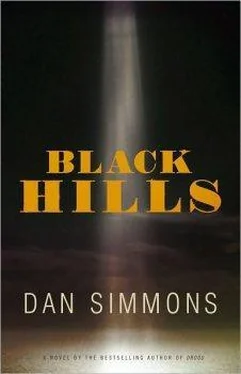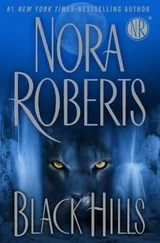Hoot had no kerchief. He tried to hike his shirt up over his mouth and nose while pouring water over both.
The darkness intensified even as the roar did. Hoot leaned closer and shouted into Paha Sapa’s ear, but the words were lost before they were out of the man’s mouth. Paha Sapa kept his grip on Hoot’s shirt and dragged him into the roaring darkness beyond the truck, closing his eyes so that he could see the distance and direction to the driveway and farmhouse at least in his mind’s eye.
Hoot seemed to be struggling, trying to break away—to go back to the truck?—but Paha Sapa dragged him onward.
Paha Sapa realized that the Dodge’s headlights had somehow remained on, but they’d become invisible after only three or four steps into the roaring darkness. The lightning all around them still illuminated nothing. Paha Sapa wondered if they would be trampled by the fleeing white horse turned back toward its barn or field and had a sudden urge to giggle at the thought. He knew that he would never earn a newspaper obituary, but that would have been a great one after seventy years of life.
He staggered forward—it was impossible to stand upright, and even as they hunkered into a crouch, the wind threatened to throw them both down and scuttle them away across the ditch and fields like so much wind-tossed detritus—and then Paha Sapa decided that they should be even with the driveway, so he tugged the still-struggling and writhing Hoot left and let the wind shove them south.
Once they bumped into something unmoving and solid in the darkness, but it was only Lincoln’s pickup truck, abandoned in the driveway. The driver’s-side door was wide open, and Paha Sapa could feel the dust already filling the cab. They did not tarry there.
He found the front porch by tripping over the step. For a second as he fell forward in the howling darkness, he lost Hoot, but then he swung his arms out and around and caught a grip on the stumbling wasichu’s hair and then his collar. Paha Sapa fell forward a few more steps. Already he could feel his lungs filling with the swirling, pressing, flying dirt—grains of sand and silica like so much molecule-sized sharp glass already cutting the insides of his nose and throat. Stay out here for thirty minutes of this, and their bodies, if they were found at all after the storm, would show lungs so packed solid with dirt that the autopsy doctor could compare them to vacuum cleaner bags that had never been emptied.
The front door! Paha Sapa felt it with the flat of his hand in the darkness and pounded around the edges to make sure. It was a door.
And it was boarded up.
Resisting the urge to laugh or cry or to call out to Wakan Tanka or to Coyote the Trickster in a dead man’s glee, Paha Sapa pulled Hoot through the darkness as he felt his way along the house to the left.
They fell off the low and sagging porch together. Paha Sapa was on his feet in a second, lunging toward the side of the house. If he lost the house, they were dead.
For a short, sagging shack, the farmhouse seemed to go on forever. Paha Sapa felt boarded windows under his splintered palms. If there was no way into this house…
He left that thought alone and tugged Hoot along with him. The sturdy mine worker had fallen down and not regained his feet. Paha Sapa dragged him. Drifts were building around his legs as he moved. Paha Sapa suddenly felt disoriented, as if he were climbing a steep cliff—as if the flat, baked earth of this east-Colorado farmhouse were the vertical wall of Mount Rushmore, of the defiled Six Grandfathers.
Paha Sapa felt a sudden exhilaration welling up in him. He did weep then, the tears turning to clumps of mud on his eyelids, caking and sealing his eyes shut.
He would not have to be the cause of the Four Heads’ destruction on the sacred mountain in the sacred Hills.
Wakan Tanka and the Thunder Beings had acted in his stead. Surely this terrible storm, this terrible blotting out , could not be resisted.
Lincoln and Hoot and Red had talked of President Roosevelt pondering abandoning all of the Plains states and the middle of America if no windbreak of pine trees could protect the farms and ranches and sandblasted ghost shells of the dying towns here and south of here. Suddenly Paha Sapa realized that the gods of the Lakota and the All, and possibly the ancestral ghost spirits of his people, had already acted. For more than five years, the winds had blown and the topsoil had lifted into the sky and the farms had gone fallow and been buried in their own excreta and the ranches had counted their dead cattle in the thousands as the soil dried up and blew away, carrying the last remnants of overcropped grasses with it.
The gods were acting. Nothing on earth could resist a series of storms like this. Paha Sapa knew that this—this black blizzard, this booger of a duster, this big roller—could not be resisted by mere soft, fat, God-praying wasichu. Paha Sapa knew nature intimately, and this storm, all these increasingly violent storms he’d read about and caught glimpses of in newsreels and experienced in South Dakota’s milder forms were not part of nature. No cycle of nature in the history of North America or the world had seen months of winds like this, years of drought like this, and screaming, wailing, roiling walls of suffocating death like this.
This was the gods of his people telling the Wasicun to leave forever.
Paha Sapa sobbed silently behind his kerchief, sobbed mostly from relief that he would not have to be the agent of the wasichus’ destruction. He was old. He was tired. He knew the enemy too well. He wanted this cup to pass from him—and now it had.
Inside his heart and brain and chest, the ghost of Long Hair gibbered at him. Paha Sapa could understand the words now, of course—had been able to for most of the decades he had been alive, ever since Curly and the Seventh Cavalry and the battle at Slim Buttes—but he chose not to listen now.
Suddenly Paha Sapa’s flailing left hand found nothingness… the back end of the house.
He tugged Hoot’s body through high dirt drifts into the blessed lee of the house, away from the wind.
But the dirt swirled and intruded and compelled here as well, and it was no lighter. Paha Sapa took his free hand and held it a few inches in front of his mud-caked face even as he pried open his eyelids against the mud and stinging particles.
Nothing. He literally could not see his hand in front of his face. Lightning leaped and coiled all around him—from an unseen gutter to an invisible metal clothesline post, from an unseen pump to invisible nails in the porch, from the invisible nails in the porch to a never-seen metal fence or gate twenty feet away. The lightning and static discharged and displayed all around him but never illuminated.
Paha Sapa kept the rear of the house against his right shoulder as he pulled Hoot’s body forward. Now that the wind neither shoved him from behind nor pushed against him as it had out on the road, he felt further disoriented. If it hadn’t been for the farmhouse wall to lean on, he would have fallen on his face and not risen again.
He realized that there was a wild banging ahead of him, sounding exactly as if someone were standing in the roiling darkness and firing off a heavy repeating rifle or machine gun. Paha Sapa thought of his son.
It took the wildly flapping screen door hitting him on the head and almost knocking him out before Paha Sapa identified the source of the repeated explosions. He braced the banging screen with Hoot’s body and tried the solid back door. Locked or stuck.
Paha Sapa threw his shoulder, his full weight, and the last of his energy into it.
The heavy, paintless door screeched inward, shoving against drifts and piles of sand within.
Читать дальше












